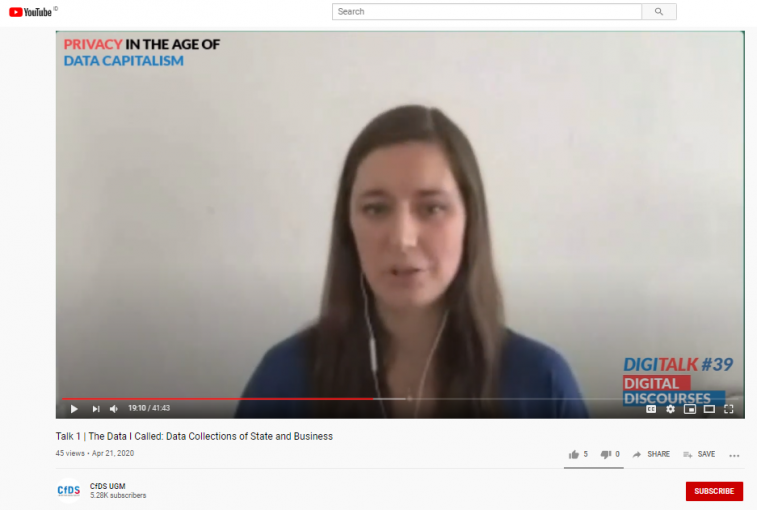
Yogyakarta, April 22nd 2020—Center for Digital Society (CfDS) held Digitalk #39 which consist of two big sessions. The first session consists of discussion about the political and commercial value of data which started from April 21st 2020 to April 23rd 2020. The first session was called “The Data I Called: Data Collection of State and Business” which was filled by Katharina Nocun, a writer and privacy activist from Germany.
In Talk 1, Katharina talked about the contents of her book which is called The Data That I Summoned. This book explained her experiment of exposing how big companies store and use consumer’s data. Katharina admits that this experiment is a frightening one which leads her to learn about herself more than she learns about data.
First of all, Katharina explained eight rights of data protection which are written in the General Data Protection Regulation by the European Union. Those rights are namely the right to information, the right to access, the right to data reparation, the right to delete, the right to process data, the right on data portability, the right to say no, and the right to evade data usage to make decisions automatically. Aside from those regulation, every Germans also have the right to ask for access towards their data from certain companies.
Her interest arose when one day Katharina asked for her data from a membership card usage in a supermarket. After asking for it twice, it turns out that the data stored was very thorough. It includes data about products bought, the price, tax, total payment, and the location of the supermarket. Moreover, there was a case in America where a pharmacy was able to know that a customer is pregnant before the family even knows just from the make up product that she bought. Hence, it is important to care for data usage since that data allows other people to know more about ourselves better than our family. Those companies can combine our data with other gathered data to get some information about our personal life.
It is a shame that this data usage is hard to evade, especially when we have a transaction with big online companies such as Amazon. Katharina tries to ask for her data after fourteen months of being online on Amazon. The data stored doesn’t only include products bought but also every tracks of Khatarina’s activity that can be used to know where she was when she opened the site, when she went shopping, how often she visits her family, vacation destination, and even how long Katharina’s browser opens the Amazon website.
Other than Amazon, Katharina also had an experiment on a streaming site which is Netflix. It turns out that Netflix not only stores data about movies that we watched or searched, but also information about on which second and minute did we skip, rewind, or fast forward a movie. Katharina admits that she often skips sadistic scenes and rewinds romantic story endings. According to her, this fact is pretty dangerous because it can be used to identify personal information such as someone’s mood and personality.
Katharina described everything as if everyone becomes naked when their data is owned by some other company. This is quite dangerous if the data is misused, for example for political means or when it is used by radical groups. By looking at their purchase history or other data, someone can be suspected or have their interest identified even if machines only gather data without figuring out the reason behind it.
Lastly, Katharina added that in this era, when we have free services, we usually pay with our data. Some services still use our data even when we have paid for it, for example Netflix. This might seem normal, but after Katharina saw what kind of data was gathered, it turns scary pretty quickly.
“The truth is everyone have something to hide, it is their privacy. Everyone needs some space for themselves,” Katharina said. That is why it is important to understand what kinds of data companies want and to understand how important a service is before handing out our data.
